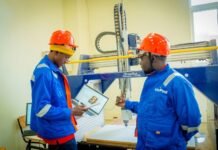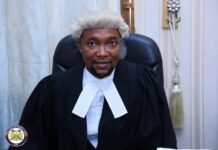By Amin Kef (Ranger)
Sierra Leone on Wednesday 3rd May, 2023 became the second African country, and the fifth globally, to launch a review of its health emergency preparedness and response capacity to identify gaps and reinforce measures against health shocks.
Dr Mohamed Juldeh Jalloh, Vice-President of Sierra Leone, launched the national Universal Health Preparedness Review (UHPR), a review process designed to bolster health emergency preparedness and response, while simultaneously building health system capacity to deliver quality universal health care.
“There is always a thin line when you are faced with a health emergency, in that you want to address the emergency without collapsing the health care delivery system,” said Dr Juldeh Jalloh. “I believe UHPR will help to address that thin line ‒ on how you respond and not lose your capability to deliver health care.”
Initially proposed by the Central African Republic and Benin in response to the challenges foregrounded by COVID-19, the State-led mechanism was launched by World Health Organization (WHO) Director-General Dr Tedros Adhanom Ghebreyesus in October 2020. Under the mechanism, countries agree to voluntary, regular and transparent peer reviews of their national health emergency preparedness capacities.
“You need to prepare for a health emergency, and you must have a resilient health system. We have adopted the life stage approach to universal health coverage so that health care is directed at every stage of life, starting with a pregnant woman, all the way until that baby is a senior citizen,” said Dr Austin H. Demby, Minister of Health in Sierra Leone. “This is where we want to go and we want WHO to support us get there faster, identifying and documenting the lessons learnt.”
The first UHPR pilot was conducted in December 2021 in the Central African Republic, followed by three others in Iraq, Portugal and Thailand.
“At its essence, the UHPR enhances how we protect ourselves, protect our neighbours and protect the world,” said Dr Mike Ryan, Executive Director of the WHO Health Emergencies Programme. “There is no global health security without national development and countries that respond to outbreaks are not doing it only for themselves, but also are doing it for the world.”
The COVID-19 pandemic demonstrated that no country is fully prepared for health emergencies, highlighting the urgent need for a cooperative platform to, among other things, promote peer-to-peer support and learning among Member States to enhance global preparedness and response, and strengthen resilience.
Despite the shocks of the Ebola outbreak in 2013 and the ongoing COVID-19 pandemic, Sierra Leone has made notable recent progress towards improving health indicators, especially in reducing maternal and under-5 mortality rates. The most recent global maternal mortality estimates (2000‒2020) show a 60% reduction in maternal mortality.
“The country-led UHPR is a cooperative initiative for building mutual trust, accountability and solidarity within and between countries to strengthen health emergency preparedness and create an enabling environment to achieve universal health coverage,” said Dr Lindiwe Makubalo, WHO Assistant Regional Director for Africa.
The UHPR harnesses an all-of-government and whole-of-society approach, engaging ministries from across governments, as well as development partners and civil society, to advance the process. The review examines best practices, gaps and challenges, along with priorities in three areas of the health response: governance, systems and financing for health emergencies, and universal health coverage.




